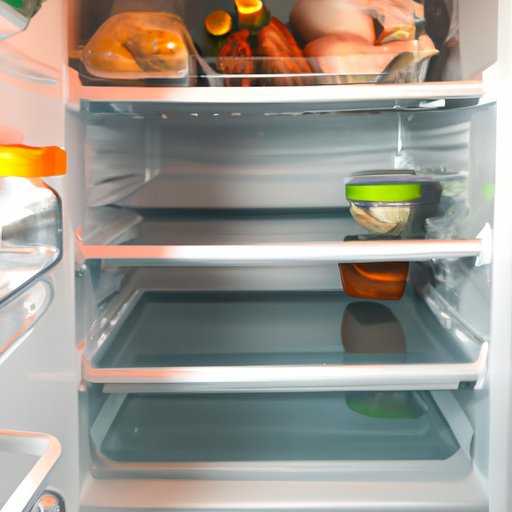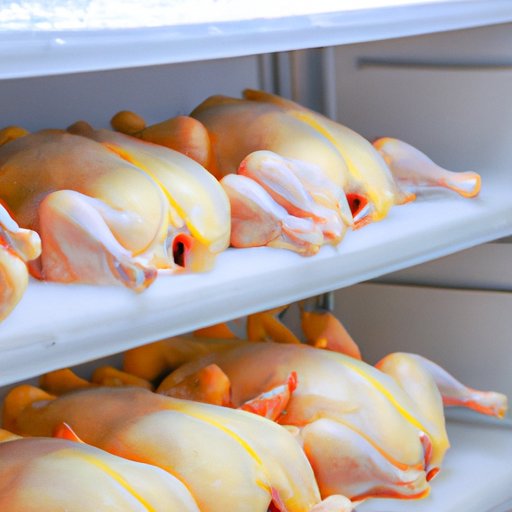Introduction
Chicken is one of the most popular proteins in the world. It’s versatile, delicious, and easy to prepare. However, it’s important to understand how to properly store and refrigerate chicken, as this will help maintain its freshness and safety for consumption. This article will provide an overview of the best practices for refrigerating chicken, including storage times, tips for proper storage, and how to tell when chicken has gone bad.
A Guide to Refrigerating Chicken: How Long Can You Store Raw and Cooked Chicken?
When it comes to refrigerating chicken, there are two main categories to consider: raw chicken and cooked chicken. Each type of chicken has different storage times and requirements, so it’s important to understand the differences between the two.
Storing Raw Chicken
Raw chicken should be stored in the coldest part of your refrigerator, preferably at or below 40°F (4°C). According to the United States Department of Agriculture (USDA), raw chicken can be safely stored in the refrigerator for 1-2 days. If you’re not planning on using the chicken within that time frame, it’s best to freeze it.
Refrigerator Storage Times
The USDA recommends that raw chicken be stored in the refrigerator for no more than 1-2 days. This is because bacteria can grow quickly on uncooked chicken, making it unsafe to eat after a few days. Therefore, it’s important to make sure that you use the chicken within this time frame.
Freezing Raw Chicken
If you won’t be able to use the raw chicken within 1-2 days, then it’s best to freeze it. The USDA recommends freezing raw chicken for up to 9 months. This will help preserve the quality and flavor of the chicken, and also prevent it from spoiling too quickly. When freezing raw chicken, be sure to wrap it tightly in freezer-safe containers or bags to prevent freezer burn.
Storing Cooked Chicken
Cooked chicken can be stored in the refrigerator for up to 3-4 days. This is because cooked chicken has already been exposed to heat, which kills any harmful bacteria. As with raw chicken, it’s important to store cooked chicken in the coldest part of your refrigerator, preferably at or below 40°F (4°C).
Refrigerator Storage Times
The USDA recommends that cooked chicken be stored in the refrigerator for no more than 3-4 days. After this time, the cooked chicken should be discarded, as it may have developed harmful bacteria. It’s also important to make sure that the cooked chicken is kept at the right temperature—at or below 40°F (4°C).
Freezing Cooked Chicken
Cooked chicken can also be frozen for longer storage. The USDA recommends freezing cooked chicken for up to 4 months. When freezing cooked chicken, it’s important to wrap it tightly in freezer-safe containers or bags to prevent freezer burn. It’s also important to label the food with the date it was cooked, as well as the “use by” date.

How to Safely Refrigerate Chicken: Tips for Proper Storage and Maximum Shelf Life
It’s important to properly store chicken in order to ensure its freshness and safety for consumption. Here are some tips for safely refrigerating chicken.
Choosing the Right Containers
When storing chicken in the refrigerator, it’s important to choose the right container. The container should be air-tight and made of a material that won’t absorb odors or flavors from other foods. Glass, plastic, and stainless steel containers are all suitable for storing chicken.
Storing Chicken in the Coldest Part of Your Fridge
It’s important to store chicken in the coldest part of your fridge, preferably at or below 40°F (4°C). This will help keep the chicken fresh and prevent the growth of harmful bacteria. The coldest part of the fridge is usually located at the bottom, near the back.
Keeping Raw and Cooked Chicken Separate
It’s important to keep raw and cooked chicken separate. The juices from raw chicken can contain bacteria that can contaminate cooked chicken, so it’s important to store them in separate containers. Additionally, it’s important to wash your hands thoroughly after handling raw chicken to prevent cross-contamination.
The Do’s and Don’ts of Refrigerating Chicken: How to Keep Your Chicken Fresh
When it comes to refrigerating chicken, there are certain do’s and don’ts that you should follow. Following these guidelines will help ensure that your chicken stays fresh and safe to consume.
Do’s
Here are some things you should do when it comes to refrigerating chicken:
Thawing Chicken Before Cooking
If you plan on cooking frozen chicken, it’s important to thaw it first. Thawing the chicken in the refrigerator is the safest way to thaw it, as it prevents the growth of bacteria. It’s also important to cook the chicken immediately after thawing, as bacteria can start to grow if the chicken is left out for too long.
Refrigerating Chicken Immediately After Use
It’s important to refrigerate chicken immediately after use. This will help prevent the growth of bacteria, and also help keep the chicken fresh for longer. It’s also important to make sure that the chicken is covered in order to prevent cross-contamination.
Always Keeping Chicken Covered
It’s important to keep chicken covered when storing it in the refrigerator. This will help prevent cross-contamination, as well as keep the chicken fresh for longer. Make sure to use air-tight containers or bags to cover the chicken.
Don’ts
Here are some things you should avoid doing when it comes to refrigerating chicken:
Leaving Chicken Out of the Refrigerator
It’s important to refrigerate chicken immediately after use. Leaving chicken out of the refrigerator can allow harmful bacteria to grow, making it unsafe to eat. It’s also important to make sure that the chicken is kept at or below 40°F (4°C) in order to prevent bacteria growth.
Reheating Cooked Chicken Too Many Times
It’s important to limit the number of times you reheat cooked chicken. Reheating the chicken multiple times can cause bacteria to grow, making it unsafe to eat. It’s best to only reheat the chicken once, and discard any leftovers after that.
Not Cleaning Your Fridge Regularly
It’s important to clean your fridge regularly in order to prevent cross-contamination. Bacteria can grow quickly in warm environments, so it’s important to make sure that your fridge is clean and free of any spills or food debris. Additionally, it’s important to check the temperature of your fridge to make sure it’s at or below 40°F (4°C).

How to Maximize the Shelf Life of Chicken in Your Fridge
There are several steps you can take to maximize the shelf life of chicken in your fridge. Here are some tips for keeping your chicken fresh:
Checking Expiration Dates
It’s important to check the expiration dates on your chicken before storing it in the refrigerator. Most chicken products have a “use by” date, which indicates when the product should be consumed. If the chicken is past its “use by” date, it should be discarded.
Wrapping Chicken Tightly
It’s important to wrap chicken tightly when storing it in the refrigerator. This will help prevent the growth of bacteria, as well as keep the chicken fresh for longer. Make sure to use air-tight containers or bags to cover the chicken.
Using an Air-Tight Container
It’s important to use an air-tight container when storing chicken in the refrigerator. This will help prevent the growth of bacteria, as well as keep the chicken fresh for longer. Make sure to use containers or bags that are designed to keep air out.
Is Refrigerated Chicken Still Good After a Week? Tips for Storing Chicken
It’s important to understand how long chicken can be stored in the refrigerator. Generally speaking, cooked chicken should be eaten within three days, and raw chicken should be eaten within two days. If you won’t be eating the chicken within this time frame, it’s best to freeze it for longer storage.
Eating Cooked Chicken Within Three Days
Cooked chicken should be eaten within three days of being cooked. This is because bacteria can start to grow on cooked chicken after this time, making it unsafe to eat. It’s also important to make sure that the cooked chicken is stored in the coldest part of your fridge, preferably at or below 40°F (4°C).
Eating Raw Chicken Within Two Days
Raw chicken should be eaten within two days of being purchased. This is because bacteria can grow quickly on uncooked chicken, making it unsafe to eat after this time. It’s also important to make sure that the raw chicken is stored in the coldest part of your fridge, preferably at or below 40°F (4°C).
Freezing Chicken When Not Eating Immediately
If you won’t be eating the chicken within two days (for raw chicken) or three days (for cooked chicken), then it’s best to freeze it. Freezing the chicken will help preserve its quality and flavor, and also prevent it from spoiling too quickly. When freezing chicken, be sure to wrap it tightly in freezer-safe containers or bags to prevent freezer burn.
How to Tell When Chicken Has Gone Bad: A Guide to Refrigerating Chicken
It’s important to understand how to tell when chicken has gone bad. Here are some signs that indicate that the chicken has spoiled:
Signs of Spoiled Chicken
When chicken has gone bad, there are several signs that can indicate this. Here are some signs to look out for:
Discoloration
If the chicken has changed color, such as turning yellow or green, then it has likely gone bad. Discolored chicken is a sign that the chicken has spoiled and should be discarded.
Unusual Smell
If the chicken has an unusual smell, such as a sour or ammonia-like odor, then it has likely gone bad. Unusual smells are a sign that the chicken has spoiled and should be discarded.
Slimy Texture
If the chicken has a slimy texture, then it has likely gone bad. Slimy chicken is a sign that the chicken has spoiled and should be discarded.
Discarding Spoiled Chicken
It’s important to discard any spoiled chicken, as it can cause food poisoning if consumed. It’s also important to dispose of the chicken in an appropriate manner, such as in a sealed bag or container.
Conclusion
Refrigerating chicken is an important step in maintaining its freshness and safety for consumption. It’s important to understand the proper storage times and techniques for both raw and cooked chicken. Additionally, it’s important to look out for signs that the chicken has spoiled, such as discoloration, unusual smell, and slimy texture. By following these guidelines, you can ensure that your chicken stays fresh and safe to consume.
Summary of Tips for Refrigerating Chicken
To summarize, here are some tips for refrigerating chicken:
- Store raw chicken in the refrigerator for 1-2 days, or freeze for up to 9 months.
- Store cooked chicken in the refrigerator for 3-4 days, or freeze for up to 4 months.
- Choose the right containers for storing chicken, such as glass, plastic, or stainless steel.
- Store chicken in the coldest part of your fridge, preferably at or below 40°F (4°C).
- Keep raw and cooked chicken separate to prevent cross-contamination.
- Thaw chicken in the refrigerator before cooking.
- Refrigerate chicken immediately after use.
- Always keep chicken covered.
- Check expiration dates before storing chicken.
- Wrap chicken tightly to prevent bacteria growth.
- Use an air-tight container to store chicken.
- Eat cooked chicken within three days, and raw chicken within two days.
- Freeze chicken when not eating immediately.
- Look out for signs that the chicken has spoiled, such as discoloration, unusual smell, and slimy texture.
Final Thoughts
Properly storing and refrigerating chicken is essential for maintaining its freshness and safety for consumption. By following the guidelines outlined in this article, you can ensure that your chicken stays fresh and safe to eat.
(Note: Is this article not meeting your expectations? Do you have knowledge or insights to share? Unlock new opportunities and expand your reach by joining our authors team. Click Registration to join us and share your expertise with our readers.)
